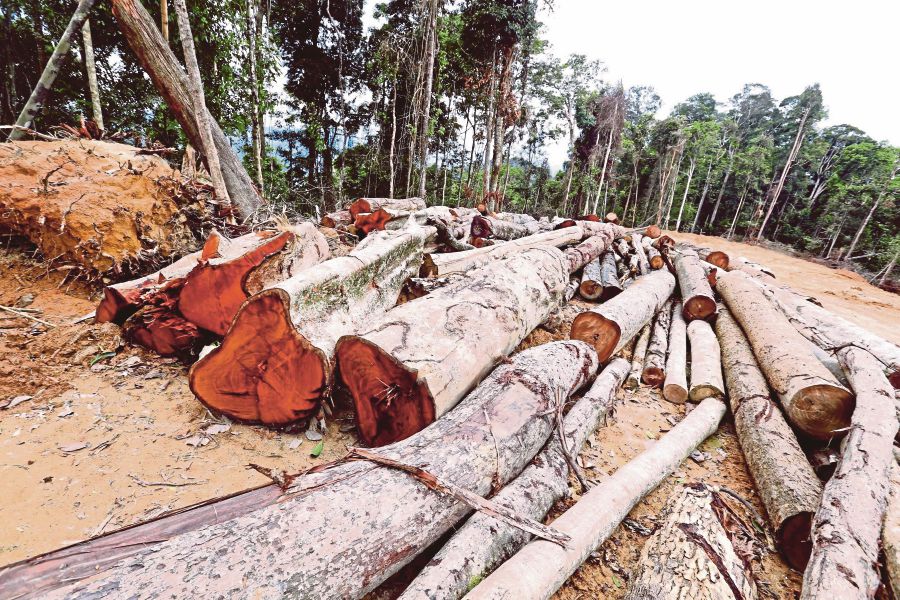
A blanket ban on logging and land clearing is the only way to stop Malayan Tigers from completely disappearing from the wild in the next five years.
Former natural resources and environment minister Datuk Seri Dr Wan Junaidi Tuanku Jaafar said instituting the ban on forests that were protected or production-based was the final card to avoid the big cat from joining the already extinct Javan and Bali Tigers.
He said this could be achieved by getting menteris besar or chief ministers to agree on the nationwide ban.
"This is not impossible. When I was a minister five to seven years ago, I managed to get them to agree, in principle, on a ban on logging and deforestation.
"I also asked them to stop 'replanting' forests as it was counterproductive to the conservation of big cats. Replanting is a farce to harvest timber and convert the forest into rubber, oil palm plantations or agricultural land.

"The replanting system only destroys the forests," he said, referring to Kelantan Forestry Department director Abdul Khalim Abu Samah's claim that logging was good for tigers as replanted forests would enable their prey to multiply.
The justification has been rejected by experts and environmentalists alike.
NEW STRATEGY
Wan Junaidi said members of parliament and the then prime minister Datuk Seri Najib Razak had also agreed to the "zero logging and deforestation" policy and encouraged him to pursue a new forestry strategy.
His plan had included restoring the fragmented and rapidly shrinking forests on the Titiwangsa Range as well as buffer areas on the central forest spine's boundaries to reinstate the minimum 100sq km range of tree cover, crucial for supporting a healthy ratio of 1:2 adult tigers.
Experts believe that to maintain viable tiger populations of at least six breeding females, reserves need to be larger than 1,000sq km to give the big cats, which number 250 in the wild, a fighting chance of survival back in 2016.
The ministry, he said, had also applied for the Redd + funding of around US$500 million for Reducing Emissions from Deforestation and Forest Degradation in 2017, under the United Nations Framework Convention on Climate Change. It is understood that these funds were also meant to be matched by the government.
The plan, among others, included giving monetary concessions to the states via royalties or grants to keep forests intact, and by having the federal government purchase or lease thousands of hectares of degraded or barren peripheral tracts from the states or private holdings.
These areas could then be retained by having them replanted with strictly endemic trees and plants, further connected to forest reserves under the states.
Wan Junaidi, however, said the regime, following his tenure, failed to chase the grant — regarded a shoo-in for Malaysia — by not following up with additional submissions.
He said it was now too late for a moratorium on logging or mapping of these forested areas, as the human-tiger conflicts were escalating and hope for the return of the tiger population was only through a blanket ban.
"There is still hope, and the solution lies with engaging the states. Contrary to popular opinion, this can be done. It requires the desire (for all stakeholders) to sit together and talk things out. All it takes is a strong will."
SPACE, PREY SCARCITY
The Kelantan government has insisted logging had nothing to do with the tiger attack in Pos Bihai, Gua Musang, and the increasing tiger sightings and activity in Orang Asli settlements there.
Indigenous community groups, however, denounced this as another denial by the state government for its role in approving land for agriculture and mining projects, which had degraded forests and rivers which Orang Asli depend on.
Community leader Nasir Dollah from Pos Ber had earlier told the New Straits Times there was only 30 per cent of the 100,000ha space left within the Balah Forest Reserve and networks, due to logging and land clearing.
The degazettement of the Perias Permanent Forest reserve, which the Balah forest branches into, was also bad news to tigers as the area was marked as their habitat under the national inventory for the species. He also said that there was no secondary forests for the tigers to seek cover in.
This lack of space and tree cover, together with prey scarcity, are some of the reasons why experts believe the animal could have broken from its primordial nature of avoiding humans.
There are now an estimated 150 tigers living in the wild, with Gua Musang being one of the last bastions for the big cat.
Ecotourism and Conservation Society Malaysia head Andrew J. Sebastian said that while tigers were reputedly elusive, there was still a dearth of studies on their behaviour in the wild, especially when facing starvation and lack of tree cover.
Wan Junaidi said all was not lost for the Malayan tiger, adding there were broad suggestions to draw from, both under the ministry's initial plans within their Redd+ proposal and beyond.
He also pointed out that some strategies, such as anti-logging compensations which were announced by the prime minister, had already been adopted.
Public-private partnership for green funds should also be tapped into, which among others would encourage local participation in conservation networks, including job opportunities with non-governmental organisations or the Wildlife and National Parks Department.
"Money is no object, if you think the tiger is as important as crude oil and other resources. You can bring the states to the table, convince them that alternative funds can be allocated and raised from the federal government, private companies and international organisations to incentivise the ban."
BUFFER ZONES
Wan Junaidi further said while logging was out of the question for natural forests, small portions within peripheral buffer zones planted with native tree species could be logged under stringent regulations in the next several decades once the tiger population had bounced back and forest cover had expanded.
This he said would help mitigate clamours from Malaysia's RM12 billion furniture industry.
Wan Junaidi also called for a moratorium to be imposed on the hunting of wild boars.
"In order to conserve tigers, we also need to protect their food source, which is the sambar deer and wild boar. If there is scarcity of prey, they will venture out from the cover of forested areas into human settlements, particularly into areas where humans have encroached into their habitats," he added.
Former Water, Land and Natural Resources Minister Datuk Dr A. Xavier Jayakumar said there should be a high-level meeting on the situation, spearheaded by the prime minister, through the recently activated Tiger Conservation Task Force.
He believed it would be challenging to get the states to give up on logging, especially for states that depend on the activity for their economy.
"Compensation by the federal government is a paltry sum. States need to decide what direction they want to go in, and whether biodiversity that comes with a healthy population of the big cats is their priority.
"Policies to ensure tiger survival need strong political will," he said, adding that states like Penang and Selangor had aggressively sought investments outside forestry resources.
The other option, he said, was to turn the Royal Belum state park into a temporary tiger sanctuary for a specific number of years until the population number had improved.
To do this, the forest should be completely closed off to people and the tigers should also be fitted with radio collar to track their movements.
Dr Xavier drew this idea from the totally protected Maliau Basin, which is within the pygmy elephants' range in Sabah, that prohibits anybody to trespass to deter poaching.
He also called on big corporations to start funding more conservation programmes in the peninsula, instead of focusing only on Sabah and Sarawak. - NST


No comments:
Post a Comment
Note: Only a member of this blog may post a comment.